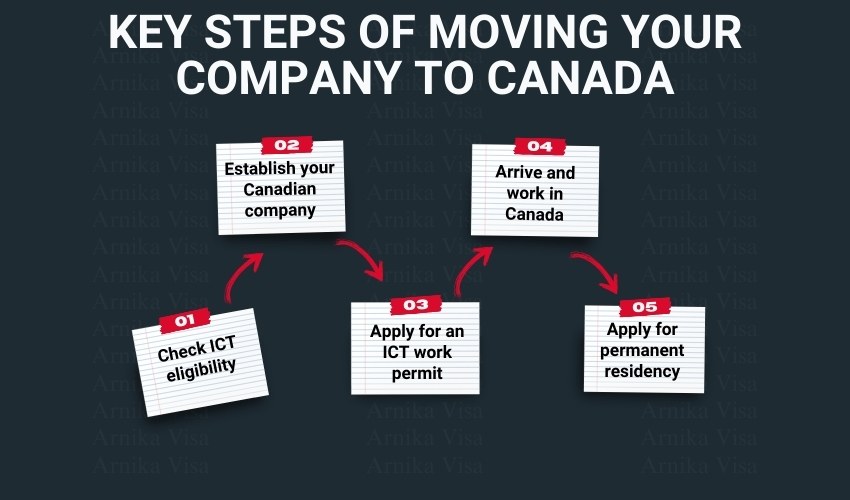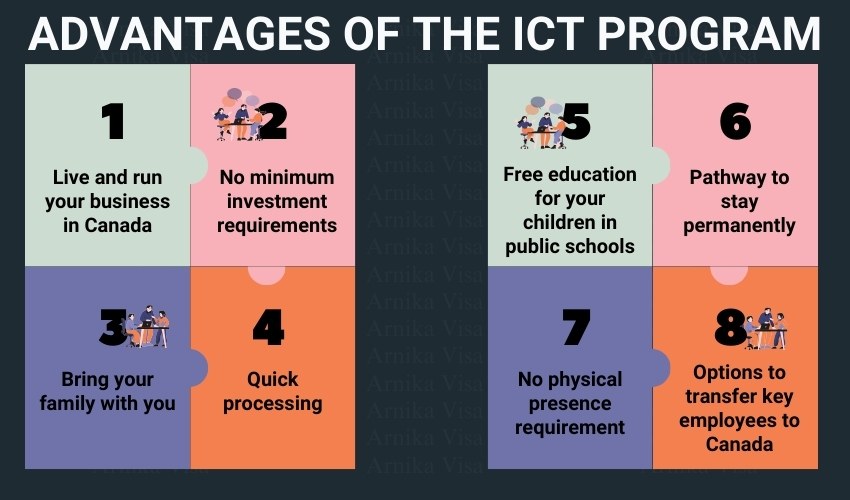Intra company transfer visa Canada FAQs – Top Questions & Answers
Multinational corporations can move essential employees to Canadian offices under the Intra company transfer visa Canada (ICT visa). By facilitating worldwide business operations, encouraging innovation, temporarily moving skilled workers, meeting labour market demands, and advancing trade and economic growth on a global scale, it allows corporate mobility.
As businesses grow internationally, intra-company transfers are becoming more frequent in today’s globalized corporate environment. Knowing the ins and outs of intra-company transfers is essential, regardless of your experience level. Let’s delve into some of the top questions surrounding this process and provide comprehensive answers to guide you through.

Can my spouse and children travel to Canada with me if I have an ICT visa?
Sure, as long as you have an Intra Company Transfer Visa Canada, you can travel to Canada with your spouse and dependent children, enabling them to live, work, or study in Canada. At the same time you are assigned, they can apply for ancillary visas, such as open work permits for wives or common-law partners and study permits for dependant children. However, it is crucial to ensure they meet all the prerequisites and eligibility standards for the visa category.
Can I use my ICT visa to work for another company in Canada?
The work permit granted under the Intra Company Transfer visa in Canada is usually associated with the Canadian business within the multinational company group that sponsored your visa. Consequently, working for another organization without an ICT permit is usually not allowed.
The ICT work permit is designed to facilitate the temporary relocation of key employees of multinational corporations to a branch, subsidiary, or affiliate in Canada. This is typically done to complete a project or meet a specific business need. The ICT’s primary aim is to allow employees to work for the Canadian organization, facilitating their move.
Working for another company without the required authorization can be against the rules of your ICT permit and Canadian immigration laws. To keep your legal status in Canada, you must abide by the terms of your visa and the laws governing immigration.
Can someone with an ICT work permit apply for permanent residence?
You can apply for permanent residency in Canada while holding an Intra-Company Transfer (ICT) work permit and running a business. However, acquiring permanent residency requires using several immigration routes, such as the Provincial Nominee Programs (PNPs), the Express Entry system, or other federal or local immigration streams.
To be eligible for permanent residency, you must fulfill the requirements of the immigration program or stream you are applying through. These include training, professional experience, language skills, and the capacity to support the Canadian economy.
Your case for permanent residence may be strengthened if you are operating a business in Canada with an ICT work permit and possess relevant expertise and qualifications. You must meet all eligibility requirements by thoroughly reviewing the rules of the immigration program for which you plan to apply.
Is my work permit for intra company transfers renewable?
Extending an Intra Company Transfer visa Canada work permit is feasible in certain situations. To be eligible for an extension of your ICT work permit, you must continue to work for the international firm and hold a managerial, executive, or specialized knowledge position.
Before your current ICT work permit expires, you should apply for an extension. To do so, you must generally submit a fresh application to Immigration, Refugees and Citizenship Canada (IRCC), with updated supporting evidence proving your ongoing employment and the reason for the request.
It’s crucial to remember that an ICT work permit’s maximum duration could be restricted, and extensions might be subject to additional criteria or limitations. Additionally, based on unique circumstances and modifications to immigration laws or regulations, eligibility requirements and application processes may change.

What happens if my business under a Canadian ICT visa is not profitable?
Assume that your company’s Canadian branch, subsidiary, or affiliate is not profitable during the first year of operation while operating in Canada with an Intra Company Transfer visa Canada. If so, it shouldn’t immediately affect your immigration status or work permit duration.
The primary purpose of the ICT work permit is to facilitate multinational corporations’ temporary relocation of essential employees to Canada to complete projects or meet particular business requirements. Individual work permit validity is usually not determined by the Canadian entity’s financial performance, though it may be in the larger context of the business’s operations.
Regardless of the company’s finances, it is imperative to guarantee that your job conditions—which include salary payments and compliance with Canadian labour standards—are upheld by the provisions of your employment agreement and relevant legislation.
Is an LMIA required for an intra-company transfer work permit?
Labour Market Impact Assessment (LMIA) is typically unnecessary for intra company transfers visa Canada (ICT Visa). Employment and Social Development Canada (ESDC) uses the Labour Market Impact Assessment (LMIA) to evaluate the effects of hiring foreign labour on the Canadian labour market. Under some conditions, the ICT program is accessible from the LMIA requirement.
Multinational corporations might temporarily assign essential staff to a Canadian branch, subsidiary, or affiliate through the ICT program to complete a particular project or business necessity. An LMIA is usually optional because the ICT program enables intra-company transfers rather than employing foreign workers from the local labour market.
ICT work permit applications, as opposed to LMIAs, concentrate on proving the qualifying relationship between the sending company (located outside of Canada) and the Canadian organization, as well as the employee’s eligibility for the transfer based on their qualifications and position within the company.
It’s crucial to remember that an LMIA can be necessary in certain situations or exceptions to apply for an ICT work permit. For instance, an LMIA might be required if the employee’s job in Canada does not match the requirements for an ICT work permit or if the transfer includes a different kind of employment agreement.
Does Canada require an IELTS to grant an ICT visa?
Generally speaking, the Canada Intra Company Transfer visa does not require language proficiency. The primary purpose of the ICT work permit is to facilitate multinational corporations’ temporary relocation of essential employees to a Canadian branch, subsidiary, or affiliate to complete specific projects or commercial requirements.
The ICT program generally does not require language proficiency, in contrast to other Canadian business immigration programs like the Canada Startup Visa, Canada Self-Employed Visa, or Provincial Entrepreneur Programs (PNPs), which may require language proficiency tests like the IELTS or CELPIP for specific categories.
Language ability, however, can still be seen as a plus, particularly if it relates to the demands of the Canadian organization or the position’s particular specifications. Proficiency in English and French communication abilities are essential for the smooth transition inside the organization and the worker’s success in their new employment in Canada.
Multinational corporations and employees should evaluate their language proficiency levels and consider any language requirements or preferences related to the transfer and their work duties in Canada, even though language tests may not be required for the ICT application.

Can I receive my salary from my company under an ICT visa?
Yes, you are usually employed by a multinational corporation that sponsors your transfer to its Canadian office, subsidiary, or affiliate under the terms of the Intra Company Transfer visa Canada. As such, when working in Canada on an ICT permit, you are eligible for your employer’s pay and other employment benefits.
The ICT work permit makes it easier for global corporations to temporarily relocate essential employees to Canada to complete projects or meet particular business requirements. As an employee of the company, you must carry out the tasks and obligations specified in your employment contract and follow all applicable employment laws and standards in Canada.
Your pay and working conditions, including benefits, should be governed by the rules of your employment agreement and any relevant Canadian laws. It is imperative to guarantee that all aspects of your work, such as wage payments, adhere to Canadian labour rules and any written agreements between you and your employer.
Does achieving my business plan objective apply under my ICT visa to Canada?
Fulfilling specific business plan objectives to get or retain the status of an Intra Company Transfer visa in Canada is usually optional. The main goal of the ICT program is to make it easier for international corporations to temporarily move essential employees to Canada to complete projects or meet specific business requirements.
Though your business plan’s goals might be vague, ensuring that your job and the type of work you do in Canada align with the ICT aims is crucial. This could entail carrying out the tasks and obligations specified in your employment agreement, supporting the Canadian entity’s development, and abiding by Canadian labour standards and regulations.
What is the processing time for Intra Company Transfer visa Canada?
Intra Company Transfer Visa Canada applications are not subject to a specified ICT Visa processing time estimate on the Immigration, Refugees and Citizenship Canada (IRCC) website. Several factors, such as the particular IRCC office handling the application, the volume of applications submitted, the quality of the application, and any additional screening or background checks needed, affect how long it takes to process an ICT visa application.
An ICT application can often be processed in a few weeks to several months, depending on the applicant. However, processing timelines might alter based on various factors, including unique situations and modifications to immigration laws or rules.
In summary, intra-company transfers promote talent mobility across borders and help businesses leverage their assets. Employers and employees can successfully traverse the intra-company transfer procedure if they know the critical questions to ask and the answers to provide.

How does Arnika Visa assist you with an ICT application?
Investors seeking to apply for an Intra Company Transfer visa Canada may benefit from the comprehensive support provided by a Registered Canadian Immigration Consultant (RCIC) during the application process. Establishing a client’s eligibility, gathering application paperwork, making sure immigration regulations are followed, assisting clients in contacting the proper authorities, and answering inquiries or concerns are all included in this. By applying your understanding of Canadian immigration law and regulations, Arnika Visa will enhance the client’s ICT work permit application, increase their chances of success, and speed up the ICT visa procedure for a smooth and valuable experience.






Hi, We are in the process of selecting an Immigration Law firm that can process an ICT application for one of our employees. We have a legitimate business registered in Canada and a sister company in Pakistan. The employee needs to be sent from Pakistan to Canada for an assignment. Please let me know if you provide this service and provide a detailed quote. Thank you.
Yes, we provide services for processing Intra-Company Transfer (ICT) applications. Given your legitimate business in Canada and the sister company in Pakistan, we can assist with transferring your employee. Please get in touch with us directly for a detailed quote, including consultation, document preparation, and application submission fees.